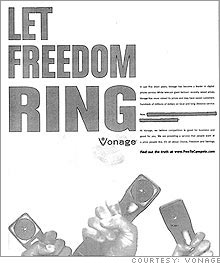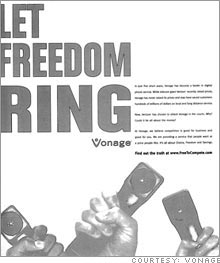Vonage and the case of the missing ad copyWhy did the Wall Street Journal request edits of a Vonage ad? Fortune's Stephanie Mehta reports.NEW YORK (Fortune) -- Readers of the The Wall Street Journal on April 27 may have noticed something unusual about the full-page ad on the back of the Marketplace section: a blacked-out sentence right in the middle of a block of text. Journal readers were left wondering: Was the hastily Magic Marker-ed out line part of the ad's creative message? Or was it covering up something truly offensive? The answer, as it turns out, is neither. The ad in question was placed by Vonage (Charts), which uses Internet technology to deliver phone calls over other companies' broadband networks. Vonage is engaged in a bruising patent dispute with Verizon (Charts, Fortune 500), the huge New York-based phone company. Earlier this year, a jury ruled that Vonage had violated key Verizon patents. Tuesday, Vonage asked for a retrial after the Supreme Court, as part of its decision in the case of KSR v. Teleflex, called for "more common sense" in assessing whether inventions were eligible for patent protection.
But Vonage isn't just sitting idly by while it waits for the courts to rule on its fate. The company decided to launch a Web site, freetocompete.com, which argues Verizon's patent litigation amounts to uncompetitive behavior. And to generate buzz for the site, Vonage placed full-page advertisements in a number of national and local newspapers, including the Wall Street Journal. As it turns out, the Journal was the only publication that asked Vonage to alter the ad. Newspapers such as The New York Times, USA Today and The Washington Post all ran the advertisement in full. The passage the Journal blanked out: "Verizon has chosen to attack Vonage in the courts. Could it be all about the money?" A Vonage spokeswoman would only call the paper's actions "highly unusual." She added: "We were surprised at their requirement for us to edit the advertisement when none of the other publications demanded the same." (Vonage supplied us with images of the Wall Street Journal and New York Times ads shown here.) A spokeswoman for Dow Jones, the publisher of the Journal (and a former employer of mine), declined comment. (Though, to be sure, Journal executives had other things on their minds after news broke of Rupert Murdoch's unsolicited offer to buy Dow Jones for $5 billion.) A source familiar with the whole redaction situation tells Fortune that Vonage's agency sought early last week to place the ads in several publications based on when the company could get the most favorable rates. (A black and white, full-page ad in the Wall Street Journal's national edition can run close to $200,000 for one-time buyers, according to the newspaper's Web site.) By the time the Journal planned to run the ad, it had already appeared in other news outlets. The source says Vonage's advertising agency got a call late Thursday afternoon, the day before the Journal planned to run the ad, asking for changes. The paper's advertising department questioned Vonage's claim it had never raised its prices; Vonage representatives had to provide the Journal with SEC filings that showed the company had, in fact, lowered its rates during the course of its short life. The Journal also had problems with language that suggested Verizon's patent case was "all about the money." The source says Vonage was unwilling to edit the advertisement at the 11th hour, and instead proposed blacking out the language in question. At 10:30 p.m. Thursday, the Journal agreed to run the advertisement with the redaction. Conspiracy theories abound in the blogosphere. A headline about the item on DSLreports.com reads: "Wall Street Journal Votes for Verizon: Censoring of Vonage ads is suspect." The commentary seems to be suggesting the Journal was trying to protect another, bigger advertiser: Verizon. That doesn't exactly hold up, though. The New York Times, for example, didn't ask for redactions, and the Times gets much more advertising from Verizon, which heavily advertises its wireless services in its more consumer-oriented pages. Same goes for USA Today and The Washington Post. More like, the Journal was seeking to protect Vonage - and itself - from using legally questionable language. But as one source close to Vonage put it: "Vonage wasn't asking the Wall Street Journal to act as its attorney, it was asking the Wall Street Journal to take its money and accept the ad." |
|


